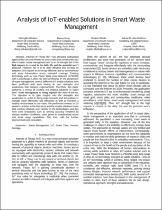JavaScript is disabled for your browser. Some features of this site may not work without it.
- ResearchSpace
- →
- Research Publications/Outputs
- →
- Conference Publications
- →
- View Item
| dc.contributor.author |
Mdukaza, S

|
|
| dc.contributor.author |
Isong, B

|
|
| dc.contributor.author |
Dladlu, N

|
|
| dc.contributor.author |
Abu-Mahfouz, Adnan MI

|
|
| dc.date.accessioned | 2019-03-22T11:42:16Z | |
| dc.date.available | 2019-03-22T11:42:16Z | |
| dc.date.issued | 2018-10 | |
| dc.identifier.citation | Mdukaza, S. et al. 2018. Analysis of IoT-enabled solutions in smart waste management. IECON 2018 - The 44th Annual Conference of the IEEE Industrial Electronics Society, 21-23 October 2018, Washington D.C, USA, pp. 4639-4644 | en_US |
| dc.identifier.isbn | 978-1-5090-6684-1 | |
| dc.identifier.uri | DOI: 10.1109/IECON.2018.8591236 | |
| dc.identifier.uri | https://ieeexplore.ieee.org/document/8591236 | |
| dc.identifier.uri | http://hdl.handle.net/10204/10814 | |
| dc.description | Copyright: 2018 IEEE. Due to copyright restrictions, the attached PDF file contains the accepted version of the published item. For access to the published version, please consult the publisher's website | en_US |
| dc.description.abstract | Internet of Things (IoT) has attracted widespread applicability not only limited to smart cities and communities but also in water, waste management and so on. It strength lies in the high impacts it created in the daily life and the potential user’s behavior. However, for it to be more effective and increase its adoption, it is require to be energy efficient, able to communicate and share information across extended coverage. Existing technology such as Low Power Wide Area Network (LPWAN) with Long Range (LoRa) has been promising. In the perspective of waste management, several different IoT-enable solutions have been proffered with each having its own strengths and weaknesses that requires improvements. Therefore, this paper performs a review of existing IoT-enabled solutions in smart cites’ waste management to bring together the state-of-the-art. The objective is to gain insights into the strengths and weaknesses in order to bring improvements and innovations to manage waste effectively and efficiently as well as maintain a healthy environment in our cities. We performed reviews on 15 research articles in the literature and the results obtained shows that existing solutions were similar in the technologies used but have some drawbacks such as sensing accuracy hindered by various weather conditions, users prone to unauthorized access and short range capabilities. This thus, calls for further improvement and innovation. | en_US |
| dc.language.iso | en | en_US |
| dc.publisher | IEEE | en_US |
| dc.relation.ispartofseries | Worklist;21886 | |
| dc.subject | Internet of Things | en_US |
| dc.subject | IoT | en_US |
| dc.subject | Low Power Wide Area Network | en_US |
| dc.subject | LPWAN | en_US |
| dc.subject | Waste management | en_US |
| dc.subject | Smart Cities | en_US |
| dc.subject | Sensors | en_US |
| dc.subject | Garbage | en_US |
| dc.title | Analysis of IoT-enabled solutions in smart waste management | en_US |
| dc.type | Conference Presentation | en_US |
| dc.identifier.apacitation | Mdukaza, S., Isong, B., Dladlu, N., & Abu-Mahfouz, A. M. (2018). Analysis of IoT-enabled solutions in smart waste management. IEEE. http://hdl.handle.net/10204/10814 | en_ZA |
| dc.identifier.chicagocitation | Mdukaza, S, B Isong, N Dladlu, and Adnan MI Abu-Mahfouz. "Analysis of IoT-enabled solutions in smart waste management." (2018): http://hdl.handle.net/10204/10814 | en_ZA |
| dc.identifier.vancouvercitation | Mdukaza S, Isong B, Dladlu N, Abu-Mahfouz AM, Analysis of IoT-enabled solutions in smart waste management; IEEE; 2018. http://hdl.handle.net/10204/10814 . | en_ZA |
| dc.identifier.ris | TY - Conference Presentation AU - Mdukaza, S AU - Isong, B AU - Dladlu, N AU - Abu-Mahfouz, Adnan MI AB - Internet of Things (IoT) has attracted widespread applicability not only limited to smart cities and communities but also in water, waste management and so on. It strength lies in the high impacts it created in the daily life and the potential user’s behavior. However, for it to be more effective and increase its adoption, it is require to be energy efficient, able to communicate and share information across extended coverage. Existing technology such as Low Power Wide Area Network (LPWAN) with Long Range (LoRa) has been promising. In the perspective of waste management, several different IoT-enable solutions have been proffered with each having its own strengths and weaknesses that requires improvements. Therefore, this paper performs a review of existing IoT-enabled solutions in smart cites’ waste management to bring together the state-of-the-art. The objective is to gain insights into the strengths and weaknesses in order to bring improvements and innovations to manage waste effectively and efficiently as well as maintain a healthy environment in our cities. We performed reviews on 15 research articles in the literature and the results obtained shows that existing solutions were similar in the technologies used but have some drawbacks such as sensing accuracy hindered by various weather conditions, users prone to unauthorized access and short range capabilities. This thus, calls for further improvement and innovation. DA - 2018-10 DB - ResearchSpace DP - CSIR KW - Internet of Things KW - IoT KW - Low Power Wide Area Network KW - LPWAN KW - Waste management KW - Smart Cities KW - Sensors KW - Garbage LK - https://researchspace.csir.co.za PY - 2018 SM - 978-1-5090-6684-1 T1 - Analysis of IoT-enabled solutions in smart waste management TI - Analysis of IoT-enabled solutions in smart waste management UR - http://hdl.handle.net/10204/10814 ER - | en_ZA |






